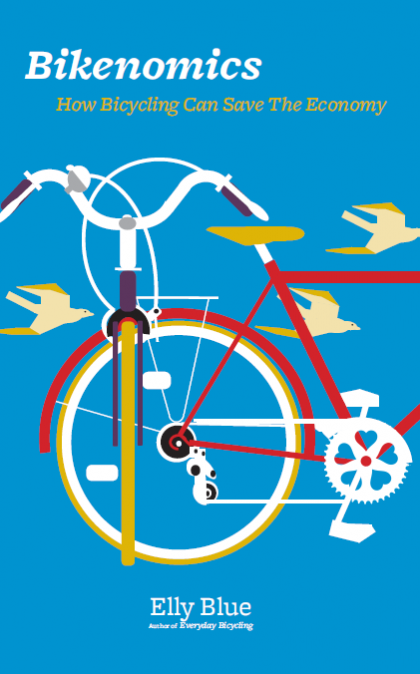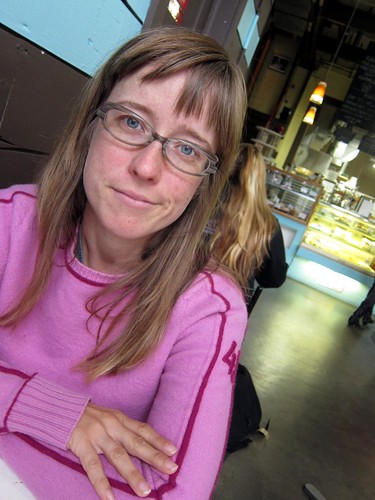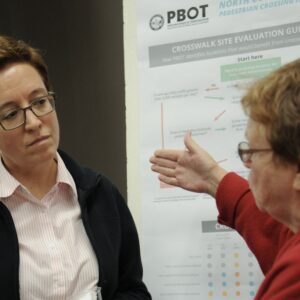As she writes in her new book Bikenomics, Portland-based bike writer Elly Blue backed into bike activism in her mid-20s, when she realized that bikes advanced so many of her other wishes for the country.
Almost a decade later, Blue has organized years of observations about the economic benefits of biking into a 194-page book of deeply rational arguments that’s poised to make a splash. It’s studded with stories from her reporting around the United States and anecdotes from her own life and work. Yesterday I talked to Blue, 35 (founder of Elly Blue Publishing, a columnist for Bicycling.com, self-publisher of the quarterly zine Taking the Lane and a former managing editor here at BikePortland), in an email conversation about the country’s most underrated biking city, one of her frustrations with this very blog, and that one time she finally learned to drive.
You’re the queen of bike statistics. Pick your favorite.
There’s this stat floating around that the average amount people spend on their bikes each year is $302. The source paper is actually a survey of self-identified bike commuters published in 1997 — who identify as mostly white, professional men, average age of 39 — a nonrepresentative sample if I ever saw one. They actually say they spent an average of $302 on new bikes alone each year. When they add up gear and maintenance, they spent more like $700 or $800. Transportation economist Todd Litman does a much better analysis, looking at the actual cost of bikes and maintenance each year — this is much more similar to the costs of driving analysis that AAA does — and the funny thing is he comes up with about $300 a year as the “true” cost of biking. So the wrong statistic is actually closer to reality. Actually, as I learned writing this book, statistics are really more of an art form than a science and any truth they represent is a function of this.
One of my favorite passages in the book is a description of your learning to drive, at age 27. First of all, what on earth convinced you to do this? Second, what did you discover?
What can I say, people have done way sillier things in order to bond with their boyfriends. The thing that surprised me most was that driving and even parking in downtown Portland was the easiest for me — it’s chaotic, but everything happens at bike speed. Urban freeways and rural roads were the worst — you’re supposed to go really fast but there’s too much going on to really process. I’m sure like anything else it gets easier the more you do it, but I wasn’t willing to put in the hours. Anyway, there’s no need. When you have a car available, you come up with reasons to use it, but those tend to disappear along with the car.
Most people who would read a book about bikes already like them, and for fairly uncomplicated reasons. Why load our brains up with complicated arguments, too?
I cry foul on this question — have you been on the Internet lately? People love to make bicycling as complicated as possible. Most of us can’t just go for a ride, we have to get all worked up about the right things to wear and how to signal our turns and helmets and what kind of infrastructure and are bike share bikes dorky … I love it all. I have opinions on some of it, which I share in the book — there should be something in there to rile up everyone — but like most of the book’s core readership, I really do thrive on the debate.
That said, the powers that be have informed me that this book is being set up to be widely read by people whose relationship with bicycling is far more casual. I’m especially glad about this, because they’ll likely have totally new and exciting ideas to bring to the table.
Have you ever shared your key “bikenomics” arguments with people from bike-friendly countries? Do they tend to respond differently than Americans?
Not much. People from super-bikey countries often seem to only want to talk about how effed the U.S. is, which is not productive and kind of boring. I decided early on that this was a book about the U.S., our history, and our potential.
Your work takes you on the road a lot. What’s the most underrated biking city in the country?
It’s hard to pick just one. A lot of cities are really changing the game with bike share and big investments in new off- and on-street networks. DC is an example of a city that’s done all three and is winning big. In 2009, I thought it was the worst city I’d ever biked in (that was before I went to Vegas), and now it’s really fun and relaxing. You can tell when a city is having a moment, when a ton of people are biking, and progress is being made but not quickly enough, so everyone’s engaged and there’s this amazing energy. Seattle seems to be having that right now, and Pittsburgh and Philadelphia, and both Cleveland and Columbus, Ohio.
I was surprised at how many Portland stories are in this book. When people from other cities tell you Portland is different and your ideas don’t apply elsewhere, how do you respond?
I ask for specifics, and they point out our weather, our topography, and our culture. Then I point out Seattle’s hills, Minneapolis’s winters, and… well, nearly every emerging bike-friendly city seems to be larger than Portland.
“If you’re creating an elite club that only can only really function in certain neighborhoods, what’s the point?”
— Elly Blue, author
You talk about race and class more than some bicycle advocates. Should more of us do so? Why?
It just kills me to hear people say — including on this blog, sorry guys — that bicycling is a civil rights issue, and in the same breath say that equitable access to bicycling isn’t an important issue*. It’s the only important issue. If you’re creating an elite club that only can only really function in certain neighborhoods, what’s the point? The thesis of Bikenomics is that access to bicycling — which means a lot of things — can transform the economy, your health, your safety, your community, your happiness. Why limit that access? Why limit who is involved in advocacy, who is reached out to and represented, who the movement is led by?
A lot of mainstream bike advocates in the last several decades have come out of the sports and recreational sides of cycling. Not everyone who is into that is relatively well off or white or male, but that’s the statistical tendency. And this comes with some major blind spots that are uncomfortable to have brought to light. Anne Lusk’s recent study finding that predominately male traffic engineers are less likely to consider the needs of slower transportation cyclists is a great example. So there’s this history of privileged assumptions — but that history is proving easy to get over. Which is good because this stuff is urgent, we all need it yesterday.
You also do web columns and a quarterly zine. What can print do that pixels can’t? What can a book do that periodicals can’t?
They can all do amazing things, but contrary to certain popular media narratives, old-fashioned mass-produced printed books are easiest to sell a lot of so they can get out there and change the world. Don’t worry, though: Bikenomics will also be an e-book.
Bikenomics will be available December 1st 2013 from “most any bookstore,” and can be ordered in advance at bikenomics.net.
*Note from the publisher: This site does not believe “bicycling is a civil rights issue” and that “equitable access to bicycling isn’t an important issue.”









Thanks for reading.
BikePortland has served this community with independent community journalism since 2005. We rely on subscriptions from readers like you to survive. Your financial support is vital in keeping this valuable resource alive and well.
Please subscribe today to strengthen and expand our work.
Wow. She even put a bird on it.
Can’t wait to read this book. I’m a huge fan of Elly’s zines.
Regarding the study about white male traffic engineers – I also think that we need to look beyond “transportation cyclists.” Many people (including people in low-income communities) use bikes for exercise, health, and recreation, which aren’t accounted for in traditional bicycling statistics/analysis, that are predominantly focused on commuting to work.
This is as important and relevant as it gets for all of us, whether hard core racer training on the roads, consistent commuter, casual weekend rambler, parent of emerging children cyclist etc. Elly gives us the facts (ammo) to counter the oh so common perceptions that cyclists are a burden to other “taxpayers” or that disproportional resources are being spend on cycling, or we are seeking “special rights” yadda yadda. This sort of nonsense passes as credible positioning everywhere, be it at governmental hearings, planning meetings, dinner tables or chats at work next to the water cooler. Having the facts at hand in these circumstances will serve you and all of us well. Much anti-cycling sentiment isn’t so much mean spirited as simply ignorant. Fill the void, shed some light – you will make a difference, one conversation at a time. Elly’s research will give you the power!
Wouldn’t a person specializing in bikenomics be a bikenomicist?
You are correct, though when very hungry I prefer “bikenomnomnomicist.”
I’m interested in taking a look at it, but I’m not sure I trust an anthropologist to make a solid economic argument. I guess we’ll see.
I didn’t know Elly is an anthropologist. Both subjects are similar because they study the way people behave in groups and what motivates them to behave that way. Both very important, but often overlooked subjects for anyone who wants more bicycling in cities.
Title is intriguing:
‘Bikenomics: How bicycling can save the economy’
Lots of people most likely are interested in ways the economy can be saved, though it seems Michael Andersen, bikeportland staff-person interviewing Blue, doesn’t question her about how she believes bicycling can save the economy.
If the book’s title is more than a whimsical lead-on to buy the book, and actually has recommendations about how biking can at least help in some small way to heal the economy, if not actually, ‘save’ it, that would be something.
Good point. I actually asked Elly this question when the chapbook that preceded this one came out, back in 2011, so I’ll republish our exchange from Portland Afoot here:
Why can bikes save the economy?
Because they’re cheap. Riding a bike saves money for the individual, but it saves even more money for we the people — the taxpayers. One estimate is $3,000 per vehicle per year. But I think it’s actually more than that when you consider that we spend 4 percent of our national budget just on treating diabetes patients through Medicare.
Blue’s book is loosely divided into 12 chapters. I’ll list them to give you a sense of the content: The Free Rider Myth, Whose Streets?, The Asphalt Bubble, Superhighway to Health, Learning to Share, Slowing Things Down, Parking, Redefining Safety, Bikes on Main Street, Putting Bikes To Work, Whose Streets, Indeed? and Human Infrastructure.
Michael…thanks for posting info you got earlier, about what thoughts Blue has about why she thinks biking can save the economy.
Her brief answer on this from the Portland Afoot interview is very general, but at least seems to touch on ways biking can potentially be beneficial to the enormous economic problems related to transportation infrastructure and the mode of transportation used to travel it.
Chapter titles you’ve posted from the forthcoming book help to suggest the book intends to try respond to some of the common, big questions people tend to have about the increasing presence of bikes in use on the road.
Once it’s in people’s hands and available for them to read, at this point, I’ll be looking forward to further reports about what the book may offer in the way of solid detailing of subjects those chapter titles introduce.
“Her brief answer on this from the Portland Afoot interview is very general, but at least seems to touch on ways biking can potentially be beneficial to the enormous economic problems related to transportation infrastructure and the mode of transportation used to travel it.”
Haha. It doesn’t have to be complicated, wsbob. Where’s the mystery about the thousand-and-one (economic, not to mention other) benefits of bicycling? Your ponderous reply reminds me of some of the verbal contortions in the City Club’s report, where they were trying to somehow qualify, rein in, the (impossible to overlook) benefits of bicycling.
http://bikeportland.org/2013/05/31/three-city-club-ideas-that-arent-about-bike-taxes-87573
Let’s just imagine that one quarter or one half of the population got rid of their cars, or stopped using them altogether, and instead started biking (more, lots more). The benefits are so numerous it is hard to know where to begin tallying them all. Many of the benefits have economic dimensions, if that is your lens.
Biking costs everyone (private, public, man, woman, child, direct, indirect, present, future, trade deficit, interest rates, climate, hunger, oil wars, and I could go on) far far far less than driving. We don’t have the money anyway, so avoiding borrowing it is not only sensible but also wise. Why muddy the waters?
“Your ponderous reply reminds me of some of the verbal contortions in the City Club’s report, where they were trying to somehow qualify, rein in, the (impossible to overlook) benefits of bicycling.”
That’s what economic analysis is, in order to prove that the economy will improve by make a proposed change you have to be able to quantify it in economic terms.
“The benefits are so numerous it is hard to know where to begin tallying them all. Many of the benefits have economic dimensions, if that is your lens.”
She wrote a book called Bikenomics and claims biking will save the economy, I think it’s reasonable to expect that she will provide actual economic analysis. If her book were titled “Biketopia: How Biking Will Make a Better World” then she doesn’t have to use an economic lens. If she’s claiming an economic benefit then she’s painter herself in the corner. Giving wsbob a hard time because he’s responding to the presumed purpose of the book seems silly.
“…She wrote a book called Bikenomics and claims biking will save the economy, I think it’s reasonable to expect that she will provide actual economic analysis. …” grumpcyclist
We can hope Blue with her book, has tried to do some economic analysis related to biking’s potential for helping save the economy. I think a lot of people, even though they may not ride much or at all, need some indication that their investment in bike infrastructure, encouraging people to ride, and supporting them in that effort, can help resolve some of the very basic transportation problems affecting everyone, regardless of their mode of transportation. Maybe writer Blue’s book has something positive for them.
“That’s what economic analysis is, in order to prove that the economy will improve by make a proposed change you have to be able to quantify it in economic terms.”
Are you sure? I would say an economic analysis doesn’t necessarily need to end with a dollar amount, because you never know exactly how people will value a change. Often it’s enough to have a good idea wether it’s a net gain or loss.
Parking minimums are a good example. Abolishing them will make car parking more expensive while everything else will get cheaper, likely resulting in a net gain for society. But the dollar amount of savings to society is difficult to compute, and possibly even meaningless because you don’t know how much people will value the dense, mixed-used development which is likely to follow.
The decline in miles driven happening in many countries now might be another example of how dollar-amount economics can miss the bigger picture. If people simply don’t like driving so much anymore, the numbers an economist came up with are meaningless at best, and wrong at worst. An anthropological background is useful for keeping a wider perspective.
I’m not opposed to pressing Elly Blue about the specifics. I’m all about specifics. It was the presumption (by wsbob) that biking’s economic benefits (the benefits of increasing reliance on bicycling) were somehow mysterious or unknown or might not add up to enough to warrant the title of the book that amused me.
As for giving wsbob a hard time, I find myself doing it with some frequency. He likes to disagree with lots of received opinions here, and I like to (usually but not always) disagree with the bones he picks, or how he picks them.
you wrote, in reference to the City Club report:
“That’s what economic analysis is, in order to prove that the economy will improve by make a proposed change you have to be able to quantify it in economic terms.”
While I don’t disagree that economic analysis is often (too often) enamored of quantification, the City Club report was not doing anything of the sort. My beef with their tone was not that they were somehow too analytical or quantitative; to the contrary, the writing was at times needlessly qualified and often inscrutable.
Rol said it well in response to the original announcement of the City Club research project:
http://bikeportland.org/2012/04/23/city-club-of-portland-will-embark-on-comprehensive-study-of-bicycling-70626#comment-2819391
Looks like a very useful book. Congrats, Elly!
I’d love to see an excerpt sometime (or perhaps I could just peruse it at Microcosm).
I plan on testifying at a Senate hearing on transportation issues in Washington State next month. As of now there is a proposal for new transportation revenue that includes $0 funding planned for pedestrians, bicycling and transit. Does anyone have suggestions on where to find the best information to make a cogent and informative statement? Facts, figures, what works, what doesn’t, ideas to fund, etc… Thanks!
Kristi, email me (elly at takingthelane com) and I’ll connect you with some resources that have been really helpful for me in making some of these arguments. Other commenters, I hope you enjoy reading the book as much as you enjoy arguing about what might or might not be in it. For anyone who wants a preview, here’s an excerpt, edited to make sense as a blog post: http://takingthelane.com/2013/07/12/bikenomics-outtake-the-cost-of-depreciation/
“Just as roads and cars necessarily operate at a net negative, losing money for their entire lifespans, bicycling and bicycle infrastructure produces a net positive return.”
Amen.
And if we add in a dynamic element: future prospects for asphalt’s affordability vs future prospects for bicycling’s affordability we see the two diverging even more. Feeding ourselves without asphalt or cars and trucks will be it’s own challenge, but one we know how to do if we stop being afraid of the past.
There was an editorial in Foreign Policy magazine back in January arguing that walkable communities are essential to economic recovery. The author cites market research from the National Association of Realtors and the International Ass. of Homebuilders. Somewhat related.
http://www.foreignpolicy.com/articles/2013/01/09/a_new_US_grand_strategy?page=0,3
Based on your snippet it looks like you’ aren’t doing much in the way of economic analysis. Your assertion that auto depreciation is a major source of poverty is unproven, and likely false. Those who live at or near poverty can’t afford new cars, they generally either take public transit or buy a used car. Most of the depreciation for a car happens in the first five-six years of car ownership, those who buy used (even at the $5000-$7000 range) don’t see their vehicles depreciate much, certainly not enough to be a “major source of poverty” as you claim. If you want to apply a common-sense test: how many people with brand new cars live in poverty? Or what percentage of people who are in poverty own cars and what is the percentage of people not in poverty who own cars?
If your book is indeed a serious examination of cycling in our economy then its argument should depend on quantifiable evidence. Where is that evidence?
grumpcyclist,
I think you’re missing Elly’s point. The way I understood her point about depreciation of automobiles was as a seque into the far more significant and less easily circumvented depreciation of our (auto) infrastructure. I too know people who mostly buy used cars and thereby avoid that nonsense. But I don’t think her argument requires us all to buy new cars.
Are you intentionally misreading the snippet, grumpcyclist? She doesn’t make the argument that car depreciation directly leads to poverty. The point is broader (and new cars are an example easily understood by a wide audience) that depreciation in general is a major cause of poverty. And auto depreciation – rather new or used – is probably the single largest depreciation cost for those in the lower middle class bracket. And those are the people slipping into poverty.
And, yes, while it isn’t likely such folks are buying new cars, I wonder how many buy cars they really can’t afford and, thus, have a higher cost of depreciation than they should have. I don’t know how many times I’ve seen people in crap living conditions with a nice car – because we live in a society that couples self-image with your choice of vehicle. LA is probably the extreme example of that, but it persists as far as I can tell everywhere.
Cars are expensive to own and use – and the poor take a larger hit as a percentage of their income in owning them. And while you may argue the point that buying new cars isn’t causing poverty, I don’t see where she is making that point at all.
Here you go:
“Depreciation is, for many individual consumers a hidden cost. But any responsible accounting of the costs of driving includes it as one of the largest associated with car ownership. The fact that such a large and unprofitable investment is necessary to living and working in most areas of this country is a major source of poverty and failure to get ahead for people and families, and is a hidden source of poverty on a national scale.”
She’s saying that car ownership is a major source of poverty, and arguing that depreciation is a large portion of that (since it is one of the largest cost). She does nothing to prove that car ownership and poverty are linked, she just asserts it while proving her work. Presumably if “such a large and unprofitable investment [the car]… is a major source of poverty” then she should be able to prove it. Maybe by comparing the mode-share of people in poverty (percentage who take public transit vs. drive vs. bike vs walk) to those in other income brackets. Presumably if auto ownership was a major source of poverty then those who don’t own cars should be less likely to live in poverty than those that do, right?
As I said earlier on, if she didn’t try to sell this as economic analysis (i.e. “How Bicycling Can Save the Economy” then she’d have more leeway, because really then it would just be an advocacy piece. But if she’s going to make an economic argument she’s going to have to quantify what the benefit is and use actual evidence, rather than simply asserting that what she says is true. She has been educated in an environment that insists on evidence to support one’s point of view, so I’m sure she’s well capable of producing such work if she puts her mind to it.
“It just kills me to hear people say — including on this blog, sorry guys — that bicycling is a civil rights issue, and in the same breath say that equitable access to bicycling isn’t an important issue*
“If you’re creating an elite club that only can only really function in certain neighborhoods, what’s the point?”
Didn’t think I would have ever bought a book based on two sentences, but I will come December.
And I know you all say the first sentence isn’t this blogs stance(you’ve even gone to make that your last sentence in the article), but it often appears that way. I don’t necessarily blame this blog for this, I think that many of the “powers that be” (advocacy groups, political, agency leaders etc) in this town focus their efforts in the inner core and a few select neighborhoods, and that BIkeportland by simply reporting the stories of what is happening makes it seem that way since that is where most the action has been.
I got to admit I like the attention for the mid SE side this last year. Get Barber, and middle NE some treatments like SE and watch out. And I’m willing to bet that Portland is on the verge of another “moment” that will be spurred by the Foster right sizing. Just a hunch, but this is one middle aged, middle class, white guy that wishes he had more cash, I’d be buying Foster/Powell and Lents properties like no tomorrow if I could.
The two quotes you posted are from the same paragraph/answer to the interview question ‘You talk about race and class more than some bicycle advocates. Should more of us do so? Why?’, and next include this statement: “…The thesis of Bikenomics is that access to bicycling — which means a lot of things — can transform the economy, your health, your safety, your community, your happiness. …”.
So then, ‘access to bicycling’ or “equitable access to bicycling” would seem to be what Blue considers is essential to biking being able to save or transform the economy. In the metro area, that kind of access seems to be a tough call.
wsbob, I double dare you to read the book.
I am so happy to see an exponential increase in the number of bikes navigating the streets of LA and I am hoping for initiatives that make the streets safer for bikers. I live, maybe, 8 miles from downtown LA and am looking forward to the day that I can ride safely to the city core. We need to move away from sharrows, though, and have protected lanes for cyclists.
lovely! ill add it to my reading list!